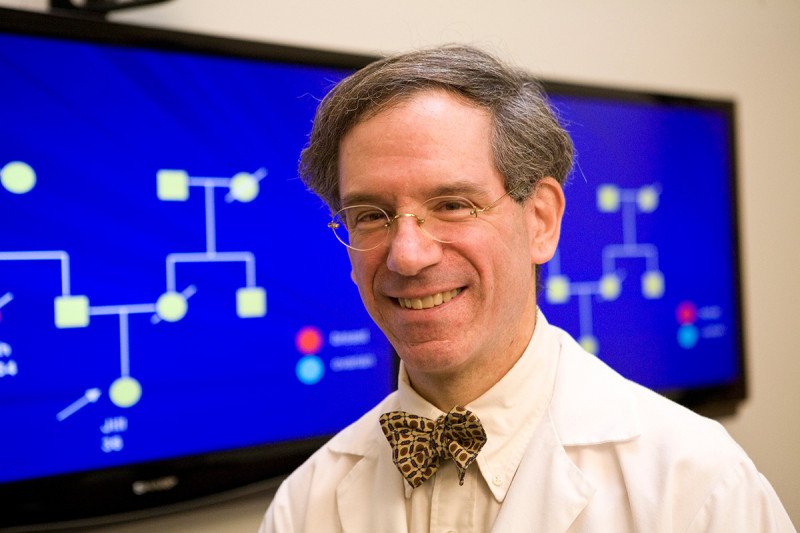
Clinical geneticist Kenneth Offit is leading the Niehaus Center.
Memorial Sloan Kettering has always been a leader in the study of inherited cancer genes. Now we’re poised to take that research to the next level, thanks to the recent creation of the Robert and Kate Niehaus Center for Inherited Cancer Genomics, established with a generous $10 million gift from philanthropist Robert Niehaus and his wife, Kate. Investigators funded by the Niehaus Center are focused on discovering the inherited causes of cancer, with the ultimate goal of using that knowledge to develop new approaches for prevention as well as earlier detection and treatment.
The Niehaus Center will make use of genomic data obtained through next-generation gene sequencing, a cutting-edge technology that enables genomes to be profiled faster and in more detail than was possible even a decade ago. MSK has already been using this type of technology through our MSK-IMPACT™ test, which finds out whether patients’ tumors carry mutations that can be targeted with drugs. The Niehaus Center will extend this approach to discover new inherited genetic changes that can be used to for both prevention and treatment.
“The Niehaus Center will take cancer risk assessment and early detection at MSK to an exciting new level,” says Kenneth Offit, Chief of MSK’s Clinical Genetics Service, who is leading the new center. “It opens a powerful window into the inherited origins of a person’s cancer. By working with these patients and their families, our genetic counselors will turn that knowledge into a preventive course of action for future generations.”
The MSK-IMPACT test, which has already screened thousands of MSK patients with advanced cancers, analyzes more than 400 of the most important cancer genes. This sequencing aims to find genetic targets for new effective therapies. To get to the heart of what makes these tumors genetically unique, a sample of the patient’s normal tissue (usually from a blood sample) is also analyzed for comparison.
Taking Advantage of Genetic Discoveries
Dr. Offit and his colleagues realized that the analysis of this normal DNA provided a treasure trove of data on the genetic alterations that cancer patients carry in their germlines (the genes inherited at birth from their parents). About two decades ago, Dr. Offit discovered the most common cancer-causing mutation in the gene BRCA2 by studying families with a history of breast and ovarian cancers.
Discovery of additional mutations in cancer susceptibility genes has led MSK’s Clinical Genetics Service to recommend increased surveillance, preventive surgeries, or other interventions for people who have inherited risks for breast, ovarian, prostate, colorectal, and thyroid cancers, among others.
Research conducted by the Niehaus Center will start with the analysis of the genes that are part of MSK-IMPACT, but those findings will be only the beginning. MSK patients who choose to participate in hereditary cancer studies will provide detailed information on their family history of cancer, and in some cases family members also may have their DNA analyzed. For families with cancer that don’t carry mutations in any of the genes that are part of MSK-IMPACT, additional genomic analyses will be performed to look for mutations in the other 20,000 human genes.
Dr. Offit explains that an important part of the process will be curating, or sifting through, the genes. “To find these mutant gene sequences, we need researchers who can interpret vast amounts of genomic data and figure out which variations are clinically important,” he says. For that purpose, Dr. Offit has named computational and experimental geneticist Vijai Joseph as Niehaus Center Associate Director for Bioinformatics Analysis. Dr. Joseph will work closely with Mark Robson, Niehaus Center Associate Director for Clinical Operations; cancer geneticist Zsofia Stadler; and Michael Walsh, a pediatric geneticist in the Niehaus Center.
Validating Findings in the Lab
Once potential new cancer-related gene mutations are found, research in cell cultures or animal models can be used to validate that they do in fact lead to cancer. The Niehaus Center will collaborate closely with MSK’s Functional Genomics Initiative, led by molecular biologist John Petrini, to evaluate what happens to cells when a mutation under investigation is inserted into them.
Recent studies by Dr. Offit, including one published this summer in the journal PLoS Genetics, have used this technique to confirm the role of gene mutations suspected to cause some cases of acute lymphoblastic leukemia, the most common blood cancer in children. The gene alterations were first found by analyzing families with a history of the disease, and then proven to be functionally significant by investigator Sabine Topka in Dr. Offit’s lab.
Another recent study from members of the Niehaus Center, done in collaboration with colleagues from the Marie-Josée and Henry R. Kravis Center for Molecular Oncology and MSK’s Department of Pathology and published last month in JAMA Oncology, looked at the findings from 1,566 patients with cancer who were analyzed with MSK-IMPACT to scan more than 300 genes, including those associated with inherited cancers.
The investigators found that 198 of the patients had mutations in genes associated with hereditary cancers, but that more than half of those mutations were not currently associated with the type of cancer for which the patient was being treated. “Doing more of these kinds of studies will increase our understanding of how inherited mutations can lead to a number of different cancers,” Dr. Offit says. “They also suggest that inherited cancers may be much more common that we previously believed.”
“And unlike other studies looking for hereditary genes, where the people who contribute DNA and other medical data are anonymous, being able to link specific mutations back to individual families going forward is a vital aspect of this effort,” Dr. Offit adds. “We plan to be able to go back to these patients and their families to inform them about what we find so that they can make healthcare decisions based on that information.”





